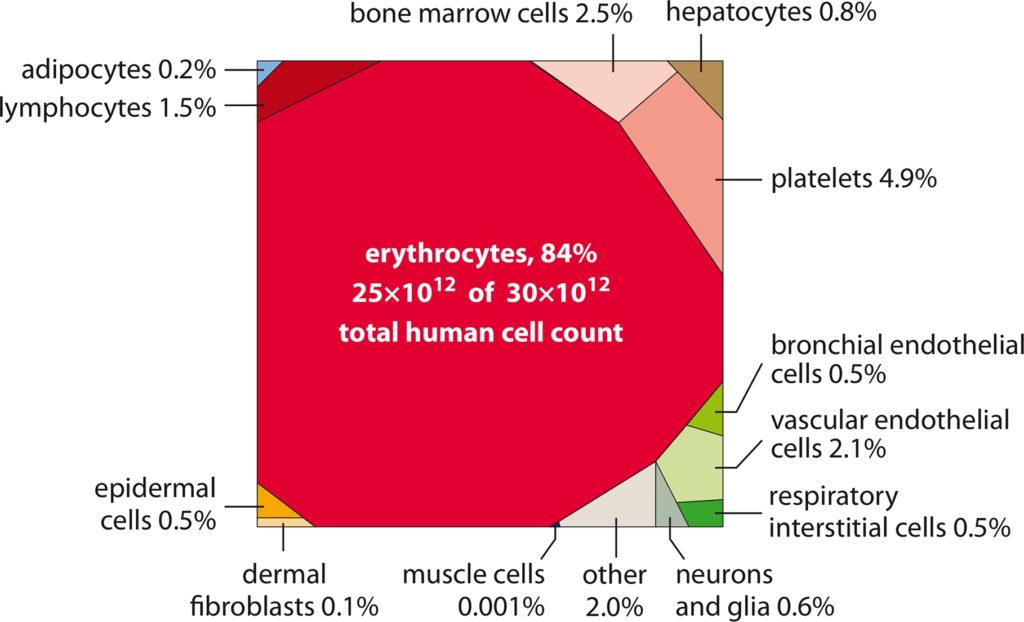When I was still in school, the rule-of-thumb for the human microbiome -- the sum total of microbes that live in and on our bodies -- was that bacteria outnumbered human cells 10 to 1. Specifically, it was believed that the average person has 10 trillion human cells and carries 100 trillion bacteria.
Not so, say the authors of a new PLoS Biology paper, who re-crunched the numbers. According to their estimate, the human body actually consists of 30 trillion cells, and our bacterial allies only number 38 trillion. The ratio, therefore, is much closer to 1 to 1. The authors explain that the original estimates were little more than "back-of-the-envelope" calculations. As such, they served as useful reference points, but more accurate data is now available.
 Sender R et al., PLoS Biol, 2016. doi: 10.1371/journal.pbio.1002533
Sender R et al., PLoS Biol, 2016. doi: 10.1371/journal.pbio.1002533
By far, the vast majority of bacteria live in our colons. So, the authors focused on getting as accurate a gut flora count as possible. Their calculations led them to conclude that the average 70-kg man carries roughly 38 trillion bacteria in his gut. Because the sum total of all other bacteria in and on our bodies (skin, etc.) is minuscule by comparison*, the authors used 38 trillion as their estimate for total number of bacterial cells.
Next, the authors examined the number of cells in the human body. The previous estimate of 10 trillion cells was based on dividing the mass of a 100-kg man by a very rough estimate of the mass of a cell. To get a more accurate number, the authors turned to the literature, particularly a paper published in 2013 that attempted to calculate the total number of cells in the human body. That study concluded 37 trillion cells. In this study, the authors' census tabulated a similar but slightly lower number, 30 trillion cells. Furthermore, the authors obtained information on tissue mass from the literature. (See figures.)
 NOTE: The average 70-kg man contains about 24 kg of non-cellular fluids and solids. That is why the mass of the 70-kg man only adds up to 46 kg in this figure. (Credit: Sender R et al., PLoS Biol, 2016. doi: 10.1371/journal.pbio.1002533)
NOTE: The average 70-kg man contains about 24 kg of non-cellular fluids and solids. That is why the mass of the 70-kg man only adds up to 46 kg in this figure. (Credit: Sender R et al., PLoS Biol, 2016. doi: 10.1371/journal.pbio.1002533)
A few points stand out. First, the new estimate of the bacterial-to-human cell ratio of 1 to 1 is probably far more accurate than the traditional 10 to 1 ratio. Second, though the average, 70-kg man contains 3 kg of blood, the cells that make up the blood constitute 84% of all human cells. (Red blood cells are tiny!) By contrast, muscle (0.001% of all cells) and fat (0.2%) constitute 20 kg and 13 kg of mass, respectively. Those are some massive cells!
Source: Sender R, Fuchs S, Milo R. "Revised Estimates for the Number of Human and Bacteria Cells in the Body." PLoS Biol 14(8): e1002533. Published: 19-Aug-2016. doi: 10.1371/journal.pbio.1002533 *At most, all the other bacteria combined sum to 1 trillion, which would bring the grand total to 39 trillion.

